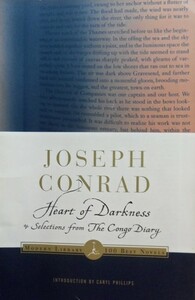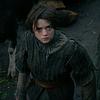Take a photo of a barcode or cover
A slog to get through, hopefully will come back when I have less I actively want to read
challenging
dark
slow-paced
Plot or Character Driven:
Character
challenging
dark
mysterious
sad
tense
medium-paced
Plot or Character Driven:
Plot
Strong character development:
Yes
Loveable characters:
No
Diverse cast of characters:
Complicated
Flaws of characters a main focus:
Yes
Okay so, Heart of Darkness was a ride.
Not gonna lie, I needed some notes at times to really follow what was going on. Definitely not the easiest book I’ve read. Well, I haven't read much books yet because I still consider myself a pretty new reader, and this one was tough in parts.
That said, I actually enjoyed it... just in small chunks. The atmosphere was great, Dream-like and weird at times. It’s one of those books I’m glad I pushed through, even if I didn’t fully “get” everything right away.
Not gonna lie, I needed some notes at times to really follow what was going on. Definitely not the easiest book I’ve read. Well, I haven't read much books yet because I still consider myself a pretty new reader, and this one was tough in parts.
That said, I actually enjoyed it... just in small chunks. The atmosphere was great, Dream-like and weird at times. It’s one of those books I’m glad I pushed through, even if I didn’t fully “get” everything right away.
dark
tense
fast-paced
Plot or Character Driven:
Plot
Strong character development:
No
Loveable characters:
No
Diverse cast of characters:
No
Flaws of characters a main focus:
Yes
Really only 1 star for the story and an extra star for the exceptional performance of narrator Kenneth Branagh.
I get how this was a bold statement against the exploitation committed by the ivory trading companies in Africa in the late 1800’s. There is even some very evocative prose that made me think this was headed in a very interesting direction.
And this sounded even more impressive when read by Kenneth Branagh. But, even though there were some very quotable observations about human nature, the story never really pulled me in.
After an acount about how Marlow, the narrator, managed to get assigned as a steamboat captain for the ivory trading company and some description of the wretched jungle conditions and the primitive nature of the natives, the plot primarily focuses on one of the trading company agents, Kurtz, (the Marlon Brandon character in Apocalypse Now). Kurtz’s astonishing success in obtaining impossible amounts of ivory has won him the esteem of the trading company and the envy of his fellow agents. His apparently charismatic personality also causes him to be cultishly worshiped by the natives.
Marlow became obsessed with Kurtz before even he met him – an obsession based entirely on the man’s reputation and a few very vague stories from people who had heard the stories from someone who heard the stories from someone else. Now years later he still can’t get the “remarkable man” out of his mind.
Since Kurtz was ill and mostly non-verbal by the time Marlow arrived at his station, he never actually experienced any direct evidence of Kurtz’s charismatic personality or of the “mind enlarging” wisdom the Russian (who both loved and feared Kurtz) enthusiastically described:
Wow! I wish Conrad would have shared some of that awesome poetry with the reader, but, alas, we only get to hear about the legend of the poetry. The great wisdom that Marlow actually heard with his own ears from Kurtz's lips which he felt totally justified his premature fan-girl adoration and locked Kurtz into god-like status in his mind for all-time?
Yep. A revelation so precise he had to say it twice. (And this is also Brando’s most memorable line from Apocalypse Now)
This Deep Thought was not even in response to any question or a reaction to anything currently happening – he wasn’t even glancing towards his lovely human-head lawn ornaments - so it just seemed to be the senseless mutterings of an insane person. I clearly just didn’t get it, but Marlow did:
I wasn’t convinced. Guess you had to be there.
I’m pretty sure I wouldn’t have finished this short novella if I hadn’t been listening to the brilliant narration of Kenneth Branagh.
I get how this was a bold statement against the exploitation committed by the ivory trading companies in Africa in the late 1800’s. There is even some very evocative prose that made me think this was headed in a very interesting direction.
The word ‘ivory’ rang in the air, was whispered, was sighed. You would think they were praying to it. A taint of imbecile rapacity blew through it all, like a whiff from some corpse. By Jove! I’ve never seen anything so unreal in my life. And outside, the silent wilderness surrounding this cleared speck on the earth struck me as something great and invincible, like evil or truth, waiting patiently for the passing away of this fantastic invasion.
And this sounded even more impressive when read by Kenneth Branagh. But, even though there were some very quotable observations about human nature, the story never really pulled me in.
After an acount about how Marlow, the narrator, managed to get assigned as a steamboat captain for the ivory trading company and some description of the wretched jungle conditions and the primitive nature of the natives, the plot primarily focuses on one of the trading company agents, Kurtz, (the Marlon Brandon character in Apocalypse Now). Kurtz’s astonishing success in obtaining impossible amounts of ivory has won him the esteem of the trading company and the envy of his fellow agents. His apparently charismatic personality also causes him to be cultishly worshiped by the natives.
Marlow became obsessed with Kurtz before even he met him – an obsession based entirely on the man’s reputation and a few very vague stories from people who had heard the stories from someone who heard the stories from someone else. Now years later he still can’t get the “remarkable man” out of his mind.
Since Kurtz was ill and mostly non-verbal by the time Marlow arrived at his station, he never actually experienced any direct evidence of Kurtz’s charismatic personality or of the “mind enlarging” wisdom the Russian (who both loved and feared Kurtz) enthusiastically described:
‘Ah! I’ll never, never meet such a man again. You ought to have heard him recite poetry—his own, too, it was, he told me. Poetry!’ He rolled his eyes at the recollection of these delights. ‘Oh, he enlarged my mind!’
Wow! I wish Conrad would have shared some of that awesome poetry with the reader, but, alas, we only get to hear about the legend of the poetry. The great wisdom that Marlow actually heard with his own ears from Kurtz's lips which he felt totally justified his premature fan-girl adoration and locked Kurtz into god-like status in his mind for all-time?
“The horror! The horror!”
Yep. A revelation so precise he had to say it twice. (And this is also Brando’s most memorable line from Apocalypse Now)
This Deep Thought was not even in response to any question or a reaction to anything currently happening – he wasn’t even glancing towards his lovely human-head lawn ornaments - so it just seemed to be the senseless mutterings of an insane person. I clearly just didn’t get it, but Marlow did:
The horror! He was a remarkable man. After all, this was the expression of some sort of belief; it had candor, it had conviction, it had a vibrating note of revolt in its whisper, it had the appalling face of a glimpsed truth—the strange commingling of desire and hate.
I wasn’t convinced. Guess you had to be there.
I’m pretty sure I wouldn’t have finished this short novella if I hadn’t been listening to the brilliant narration of Kenneth Branagh.
dark
mysterious
tense
slow-paced
Plot or Character Driven:
Plot
Strong character development:
No
Loveable characters:
No
Diverse cast of characters:
No
Flaws of characters a main focus:
N/A
dark
mysterious
sad
tense
medium-paced
Plot or Character Driven:
A mix
Strong character development:
Yes
Loveable characters:
Complicated
Diverse cast of characters:
No
Flaws of characters a main focus:
Yes
It inspired me to search more about the atrocious deeds of the whites against the blacks and I kind of regret it, because now I cannot help but think about all the other things they could've done but hid really well. Overall, a nice read and the narration style made it seem like he was talking to the reader face-to-face.




